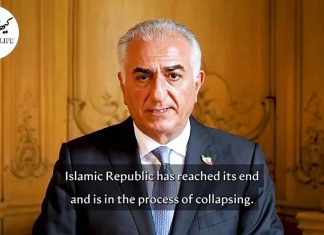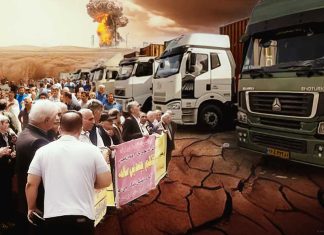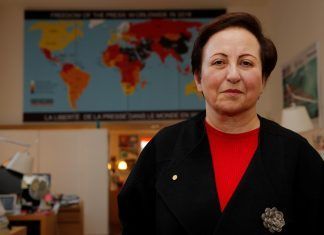By Kayhan Life Staff
A protest over severe water shortage and power cuts that started on July 15 in Hamidiyeh, the southwestern province of Khuzestan, has now spread to other cities in the region. While European countries have remained silent over the recent unrest in Iran, several U.S. lawmakers have condemned the brutal crackdown on the protests, which have reportedly resulted in many arrests and several deaths.
Speaking at his daily news briefing on July 21, U.S. State Department Spokesperson Ned Price, said: “The U.S. is following the events [in Iran], including reports that security forces have fired on these protesters. We support the rights of Iranians to assemble and to express themselves peacefully.”
“Iranians, just like any other people, should enjoy those rights without fear of violence, without fear of arbitrary detention by security forces. Thus, we are monitoring this very closely,” Mr. Price added.
On the same day, several U.S. lawmakers posted messages on social media, supporting the protesters and Iranian people.
New York Republican Congresswoman Claudia Tenney tweeted: “I strongly condemn the attacks on peaceful protestors by the regime in Iran. Like the Cuban people, the Iranian people want to be free and are demanding their basic rights.”
“The clerical regime in Tehran does not represent the history, dynamism, or future of the great Iranian people,” Ms. Tenney added.
I strongly condemn the attacks on peaceful protestors by the regime in Iran. Like the Cuban people, the Iranian people want to be free & are demanding their basic rights. The clerical regime in Tehran does not represent the history, dynamism or future of the great Iranian people.
— Congresswoman Tenney (@RepTenney) July 21, 2021
Another Republican Congresswoman from New York, Nicole Malliotakis, retweeted a message by Iranian Americans for Liberty which said: “The Iranian people are standing up against the abusive and oppressive regime in Tehran. It is just another example of how totalitarian government suppresses and reaffirms how fortunate we are to live in the USA. We must stand in support of their push for freedom and against Iran’s evil regime!”
The Iranian people are standing up against the abusive & oppressive regime in #Tehran. It’s just another example of how totalitarian govs suppress & reaffirms how fortunate we are to live in the USA. We must stand in support of their push for freedom & against Iran’s evil regime! — Office of Rep. Nicole Malliotakis (@RepMalliotakis) July 21, 2021
Republican Congresswoman Yvette Harrell, representing New Mexico, tweeted: “The people of Iran have long suffered under brutal rulers, but a government which so harshly oppresses its citizens cannot last. Freedom will prevail.”
The people of Iran have long suffered under brutal rulers, but a government which so harshly oppresses its own citizens cannot last. Freedom will prevail. https://t.co/85t6K5lIsF
— Rep. Yvette Herrell (@RepHerrell) July 21, 2021
Representative Harrell also retweeted the same message by the Iranian Americans for Liberty which. Her post also included a tweet from the press office of the Republican Senator from Florida, Marco Rubio, which said: “As the Iranian people peacefully demand freedom from the regime in Tehran, Senator Rubio condemns the regime’s brutal use of force to disperse peaceful protesters. The U.S. should stand in support of the protesters instead of negotiating a deal with the evil regime in Tehran.” Senator Rubio was among the first senior U.S. politicians to support the protesters in Khuzestan. Earlier this month, Mr. Rubio met and held talks with Crown Prince Reza Pahlavi in Washington DC. In a tweet on July 21, Reza Pahlavi urged U.S. President Joe Biden to support the Iranian people’s struggle against the Islamic Republic. “President Joe Biden, you were bold and courageous in demanding America’s solidarity with the people of South Africa,” Reza Pahlavi said. “Today, the people of Iran need and deserve the same solidarity. They are fighting for freedom and are being met with bullets. Your support is a moral imperative.”
آقای رییسجمهور بایدن، شما ۳۵سال قبل با جسارت و شجاعت خواهان همبستگی آمریکا با مردم آفریقای جنوبی شدید. امروز مردم ایران نیازمند و سزاوار همان نوع همبستگیاند. آنها برای آزادی مبارزه میکنند و رژیم پاسخشان را با گلوله میدهد. پشتیبانی شما از مبارزه ملت ایران یک ضرورت اخلاقی است. https://t.co/5gBAAXpnYV — Reza Pahlavi (@PahlaviReza) July 21, 2021
Reza Pahlavi’s tweet included undated C-SPAN footage, showing Senator Biden speaking during a hearing on the South African government’s crackdown on protesters.
In its July 21 issue, the New York Times published an article by its journalist Farnaz Fassihi, an Iranian-American Journalist, titled “I Am Thirsty! Water Shortages Compound Iran’s Problems.”
“A prolonged drought and rising temperatures from climate change, combined with decades of government mismanagement of natural resources and lack of planning, have turned the water crisis into a volatile incubator of protests and violent unrest,” Ms. Fassihi wrote. “For the past week, demonstrators have surged into the streets of parched Khuzestan Province in the southwest, the epicenter of the protests. They have been met by security forces whose crackdowns have sometimes turned deadly.”
“Khuzestan is home to an ethnic Arab population that has historically faced discrimination, and that includes a restive separatist movement. But the protesters have insisted their grievance is not tied to separatism,” Fassihi added.
While foreign news outlets have provided limited coverage of the protests in Khuzestan, others have described it as tribal and ethnic unrest. They have failed to understand that protests over water shortage in Khuzestan are part of a broader nationwide movement against the Islamic Republic’s failed social, political, and economic policies in the past four decades. Some people have even bought into a false narrative propagated by the Iranian establishment that the protests have been engineered or infiltrated, or hijacked by political opposition groups.
In a tweet on July 21, Hossein Ronaghi, an Iranian blogger and freedom of speech activist, sharply criticized Elahe Sharifpour-Hicks, a human rights researcher, for her tweets on the subject of Khuzestan. He included her English-language tweet in which she said: “Replying to @gesfandiari and @Jerusalem post. Unfortunately, many armed MKO members were among protesters in Khuzestan. The group has been supported, funded, and trained by Israel.”
Ms. Hicks, who was taken to task for those remarks, later issued a clarification, tweeting in Persian: “Innocent people and protesters in Khuzestan who have taken part in peaceful protests to demand their inalienable rights, never resort to violence. What I referred to was an article in an Israeli newspaper.”
الهه هیکس: پژوهشگر حقوق بشر وابسته به جمهوری اسلامی: «تعداد زیادی افراد مسلح عضو مجاهدین بین معترضین هستند که از طرف اسرائیل آموزش دیده و حمایت میشوند»
این چیزی فراتر از عادیسازی شَر یا پروپاگانداست، این مشارکت مستقیم در کشتار مردم معترض در خیابانهای خوزستان و ایران است. pic.twitter.com/adkLibnMrt— Hossein Ronaghi (@HosseinRonaghi) July 21, 2021
Some Iranian journalists have also claimed that secessionists organized and directed protests in Khuzestan.
In a discussion on the social media app Clubhouse, Iranian journalist Farid Modarresi and Ali Ahmad Nia, the manager of several Telegram channels, reportedly argued that the Khuzestan protests “are the voices of secessionists.”
A report by the U.S. cable network CNN titled “Water Crisis Protests Reportedly Continue in Iran, With Chants in Capital” also highlighted the ethnic tensions in Khuzestan instead of reporting on the broader implications of the protests.
“A short video posted on Twitter by New York Times journalist Farnaz Fassihi showed people at a Tehran metro station chanting ‘death to the Islamic Republic’ in a rare display of protest against the country’s clerical elite. CNN could not verify the video independently,” the report said. “In the town of Izeh, a video showed demonstrators chanting ‘Reza Shah, bless your soul.’”
“Iran’s ethnic Arab minority, who mostly live in the oil-rich Khuzestan Province, have long said they face discrimination in the country,” the report added.
The CNN report and others do not mention that Khuzestan is home to people of various ethnic backgrounds united in their efforts against the Islamic Republic. This solidarity is clear in their chants “Bakhtiari with Arab, unity, unity,” and “From Khuzestan to Tehran, we give our lives for Iran.”





